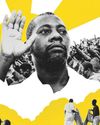CATEGORIES
Kategoriler

People of the Magazine
Jewish Currents wants to criticize Israel while holding on to Jewishness.

The Show Must Go On
What if Ronald Reagan’ Presidency never really ended?

The Mystery of Pain
Garth Greenwell’s novel of extreme affliction and ordinary happiness.

Fly with Me
The children’s books of Katherine Rundell.

AFFINITY COMEDY
The state of the Netflix standup special.

BE HER GUEST
The plush ambience of Ina Garten's good fortune.

WILD THING
MJ Lenderman resists the smoothing, neutering effects of technology.

THE HEM OF HIS GARMENT
An audience with the Pope.

LUCK OF THE DRAW
Nate Silver argues that poker can help us game our uncertain world.

GREEN SLEEVES
“What I want to know,” the woman said to the therapist, “is why the voices always say mean, terrible things.

EVERY OBITUARY'S FIRST PARAGRAPH
Alfred T. Alfred, whose invention of the plastic fastener that affixes tags to clothing upended the tag industry and made him one of America’s youngest multimillionaires—until he lost his plastic fastener fortune in a 1993 game of badminton, as depicted in the Lifetime original movie “Bad Minton”— died on Saturday. He was eighty-one.

DUTY DANCING
How Seamus Heaney wrote his way through a war.

DESPERATELY SEEKING
The supreme contradictions of Simone Weil.

SPREADING THE WEALTH
Why a young heiress asked fifty strangers to redistribute her fortune.

Early Scenes - Remembering a childhood in the South Bronx.
When I was born, in 1940, my father, Salvatore Pacino, was all of eighteen, and my mother, Rose Gerardi Pacino, was just a few years older. Suffice it to say that they were young parents, even for the time. I probably hadn’t even turned two when they split up. My mother and I lived in a series of furnished rooms in Harlem and then moved into her parents’ apartment, in the South Bronx. We hardly got any financial support from my father. Eventually, we were allotted five dollars a month by a court, just enough to cover our expenses at my grandparents’ place.

FOR LOVE OF COUNTRY
How Post Malone made himself at home in Nashville.

FAITH HEALING
\"Between the Temples.\"

A GUIDE TO BRAT SUMMER
This summer, we’ve found ourselves in an unprecedented era of Brat.

THE LAST DAY
How declining enrollment threatens education nationwide.

THE COLLECTOR
Bonnie Slotnick, the downtown food-history savant.

BUNKER MENTALITY
Shopping for a home at the end of the world.

LIVING UNDER A ROCK
A geologist reflects on her life.

THE PARTICLES OF ORDER
The guest from America was to arrive in the late afternoon.

LOVE'S LABOR'S LOST
The forgotten history of sex in America.

LIFE OF THE PARTY
The Democrats seem rejuvenated by their new candidate. Why was it so hard to get one?

The Kamala Show
The evolution of Harris’ public persona.

A Cult in the Forest - The vast majority of Kenyans are Christian, a faith that arrived with early colonization. A group of Finnish missionaries brought Pentecostalism in the nineteen-hundreds
The vast majority of Kenyans are Christian, a faith that arrived with early colonization. A group of Finnish missionaries brought Pentecostalism in the nineteen-hundreds. The colonial government tried to suppress it, because a faction of pro-independence freedom fighters belonged to the African Independent Pentecostal Church of Africa, which included messages about decolonization in its hymns. But after independence, in 1963, Pentecostalism and other forms of evangelical Christianity spread. They emphasized charismatic forms of worship—visions, spiritual healing, speaking in tongues—and a gospel that promised prosperity to the faithful. “If you want your church to be full, do what I call ‘spiritual gymnastics,’ ” Martin Olando, a scholar of African Christianity at the Bishop Hannington Institute, in Mombasa, told me. “Jump up and down, prophesize good tidings, tell people what they want to hear.” By the nineties, Kenya’s President, Daniel arap Moi, enjoyed a beneficial relationship with Arthur Kitonga, an influential Pentecostal bishop. “President Moi has been appointed by God to lead this country,” Kitonga said at the time. William Ruto, Kenya’s current President, and its first evangelical one, brought gospel singers into his campaign team and party, and has donated cars, and thousands of dollars, to evangelical churches. His wife, Rachel, invited the U.S.-based televangelist Benny Hinn to preach with her at a crusade. (This year, Hinn apologized for giving fake prophecies. “There were times when I thought God had showed me something that He wasn’t showing me,” he told the Christian podcast “Strang Report.”)

My Life's Work- All I have in the world is a paternal aunt and a tank of fish that love me. And my work. I'm nobody.
Who am I? I’m nobody. I was cut from every team in high school. I didn’t go to an Ivy League college.

FUTURE IMPERFECT
“Hum,” Helen Phillips’s third novel, begins with a needle being drawn, steadily and irreversibly, across a woman named May’s face.

THE NARAYANS
Mrs. Narayan was small, dark-skinned, oval-faced. She had a wonderful singsong voice.